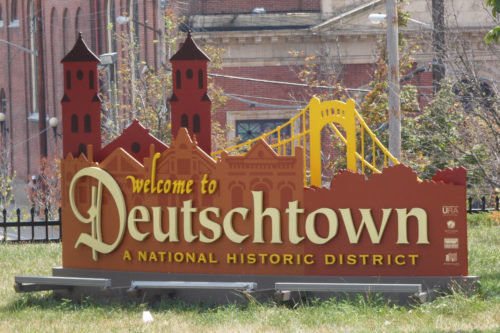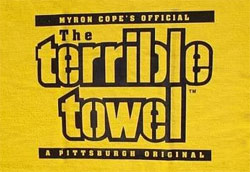
Germans Find Pittsburgh to be Wunderbar!
February 11, 2015
The Terrible Towel is Poised to Strike!
February 11, 2015Greece has made a huge impact on the world. The Greeks have made enormous contributions to architecture, philosophy, theater, politics and government, sports, mathematics, science, and medicine: literally all of Western Culture. Their homeland is only about the size of Alabama. The Greeks who came to Pittsburgh were few in number when compared to some of their other ethnic counterparts, such as the Germans, Italians, or Irish. Nevertheless, that small number of Greek immigrants who did settle here contributed to making Pittsburgh a great place to live or visit.

The First
The first Greeks arrived in the region in the late 1800s. Many of those who came here intended to earn some quick money and then return home. Who could blame them? It must have been quite difficult to come to Pittsburgh from their sun-splashed homeland. It was surrounded by the brilliant blue waters of the Aegean, Ionian, and Mediterranean Seas. It’s one of the earth’s oldest civilizations. Pittsburgh must have seemed like a wilderness.
Until the War of Independence in 1821 the Turks had dominated the Greeks for nearly 400 years. Many of the workers who came to Pittsburgh were typically unskilled and found work wherever they could. According to The American Hellenic Foundation of Western Pennsylvania there were about 50 Greek immigrants in the city by 1893. Most of whom were sailors from the various Greek islands. Most began with manual labor but would come to open their own businesses.
Many of the first immigrants were men because they intended to work then return to Greece. According to the book They Came to Pittsburgh by Clarke Thomas, it was estimated that there were “300 to 400 male Greeks before any women came, the first arriving about 1903.”
For the women who did come to Pittsburgh, life was particularly difficult. Unlike other ethnic groups the Greeks did not settle into one large area. These immigrants were scattered throughout the area. Most of the women didn’t learn to speak English since they too intended to return to Greece. They devoted themselves to tending the home, working in their church, and preserving their Greek heritage.
In 1912, it is estimated that 20 percent of the Greek men living in Pittsburgh did return to Greece to fight in the Balkan Wars that came before World War I. Those who remained, and those that followed later, quickly came to realize that to achieve the American dream they would need to strike out on their own. Many opened restaurants, confectionaries, and coffee houses.
Greek Orthodox Faith
One stabilizing factor in an otherwise unstable period for these immigrants was their Greek Orthodox faith. Eight Orthodox Metropolises comprise The Greek Orthodox Archdiocese of America. Pittsburgh is one of those eight Metropolises. It tends to the spiritual needs of Greek Orthodox parishes and monasteries in Pennsylvania, Ohio, and West Virginia. The Metropolis office has its headquarters on Ellsworth Avenue. There are nearly a dozen Greek Orthodox churches in the Pittsburgh area.
Although many of the immigrants lacked financial means, they felt it important to build churches in which to worship. In 1923, St. Nicholas Cathedral, on Dithridge Street in Oakland, became the seat of the Pittsburgh Metropolis. That same year, Holy Trinity Greek Orthodox Church was established on Pittsburgh’s North Side. This helped accommodate the swelling Greek population in the area. Holy Trinity has since relocated to McCandless Township.
One of the most beautiful elements of a Greek Orthodox Church is its iconostasis. This is the wall of icons separating the nave from the sanctuary. Often these are gilded and awe-inspiring works of art, as well as sacred artifacts.
In addition to tending to their spiritual needs, the Greek Orthodox Church also provided a way to preserve the Greek culture. Many of the churches in the area offer ministry, social groups, and Greek language lessons.
Culture
Many of the Greek Orthodox churches in the area hold food festivals. Many Pittsburghers look forward to celebrating Greek heritage through its food and culture. Like many of the other ethnic groups in the area, the Greeks have their Kennywood Amusement Park Day and a classroom in the Cathedral of Learning’s Nationality Rooms. The Greek room was dedicated in 1941. It pays homage to the nation’s illustrious legacy by featuring Greek architecture and motifs. The backs of student’s chairs are decorated with the names of Greek cities. The Professor’s and guest lecturer’s chairs are named Plato, Aristotle, and Socrates.
While many of the Greeks came to the area intending to return home, our city has been deeply enriched by those who chose to stay and make Pittsburgh their home.





